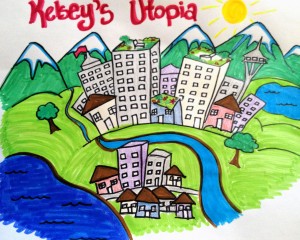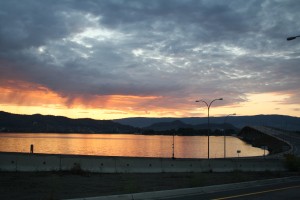While I was doing my research for my term paper (my question is: How did the proponents of garden cities believe that their proposal would solve problems such as overcrowding and poverty? Were they right? And if not, why?) I discovered that there are actually very few cases of pure garden cities, and none that were realized in the manner that Ebenezer Howard hoped that they would be. I’m doing my essay based on a few of the cities that were described in Peter Hall’s chapter on garden cities: Letchworth (the closest realization to a pure garden city), and Praunheim, Romerstadt, and Nordwestadt (attempts at a garden city in Germany). It turns out that most of the cities that had influences from the garden city movement would actually be considered to be satellite cities.
Where garden cities are surrounded by a large and permanent green belt, satellite cities are separated from the city by only a narrow green belt, or even just a park. Howard envisioned the city to be self-sufficient and self-governing, but citizens of the satellite city are quite dependent on the giant city for jobs and most other necessities, besides immediate and basic shopping needs. An example of a local satellite city in Canada would be Abbotsford, which is a satellite of Vancouver.
The fact that there are no actual realizations of the garden city (with all of its initial elements) shows that the garden city was extremely difficult, if not impossible to create to Howard’s original standards, and repeated attempts have suggested that the true garden city (to Howard at any rate) is likely unrealizable.
Author Archives: krad4d
My Utopian City
While I was creating my perfect utopian world, I began to see similarities between three cities that I have lived in, and combined the best elements from Kelowna, Edmonton, and Vancouver (in my opinion) while eliminating all of the problem areas that I have encountered in each city. For this reason, it would be called Vanmontonowna.
My utopia contains all new and modern-looking buildings that are aesthetically pleasing, while still being functional. There would be an equal ratio of apartment buildings and houses to meet every need of the citizens that live there. In addition to the plentiful parks and green spaces that are found throughout the city, each house would have a front and back yard, and every apartment building would have a rooftop garden/patio, and the city would have fields of crops and agriculture in its immediate hinterland. On one extreme side of the city would be an ocean that is bordered by a sea wall for running, biking and roller-blading. The ocean and the fields would provide a sustainable and well-balanced source of food for the city. The city would be bisected by a river that would help to irrigate the immense amount of green space, as would the surrounding lakes that are used for their beautiful beaches, fishing and exercising opportunities. Along the length of the river would be walking trails, and on every road in the city there would be a bike path to create a pollution-free option of transportation and exercise. On the opposite sides of the city from the ocean, Vanmontonowna would be surrounded by a mountain range. The forested mountains would be excellent for hiking, skiing and snowboarding, and hunting for an additional food source.
At the center of Vanmontonowna would be a pedestrian market square, that would have endless possibilities for shopping, including an open-air farmers market in the summers. Besides the roads and bike paths, there would also be an excellent transit that is easily accessible, fast, and affordable. It would cover all areas of the city and hinterland. Health care would be free, as would education (of all ages). If a person wants to learn, they have as equal an opportunity as anyone else, as long as they are willing to work for it. In university the cost of books would remain, but tuition would be free. Courses would still be very challenging, and obtaining a degree would be recognized as valuable and would improve your salary.
I also really liked Zach’s idea of a reformative government to reduce prison capacities, as well as teaching the accused to suffer consequences for their actions while improving society. Prisons would still exist for utmost crimes, such as murder and rape. There would be no death penalty. I feel like there would have to be a centralized government, because without it people would not know what to do with themselves. Society has gotten extremely lazy, but there would be rewards (such as higher pay) for people who work hard. For example, farmers and fishermen would make a moderately-high salary, because they help the city to continue going.
That’s all, let me know what you think!
The Nature of Kelowna
In our group discussions we were addressing Max Weber’s “The Nature of the City,” in particular, we were debating about the question “Does Kelowna satisfy Weber’s definition of what a city is.”
At first glance, Kelowna satisfies most of Weber’s major attributes of a city; it has a court and partially autonomous law, and it is partially self-governing due to municipal elections. Kelowna also has a much larger connection to its hinterland than most modern cities because it is based on the tourism of its lakes, mountains and wineries. Kelowna has all of the properties that Weber mentions with the exception that Kelowna does not have a fortress or garrison. Kelowna has no surrounding walls, no great military base and no other major defense system to speak of. With this in mind, according to Weber, is Kelowna still not considered a city because it is lacking fortification?
In our group we delved into this topic and realized that Kelowna does indeed have a defense system in place, just not in the way that one might expect. While Kelowna may not have physical walls surrounding the city, the natural environment provides its own defense structure. If Kelowna were under attack, the city needs only to cut off access to the roads in and out of the city. By shutting down the bridge and blocking off the road to Vernon, there is virtually no direct access to Kelowna, except from boat or plane. Kelowna is also built into a natural valley; the mountains and lake surrounding the city form a natural defense against enemies. There is no protection from an aerial attack, but even with city walls that would be next to impossible to prevent.
In this respect, our group decided that Kelowna can, and should, have city-status.


